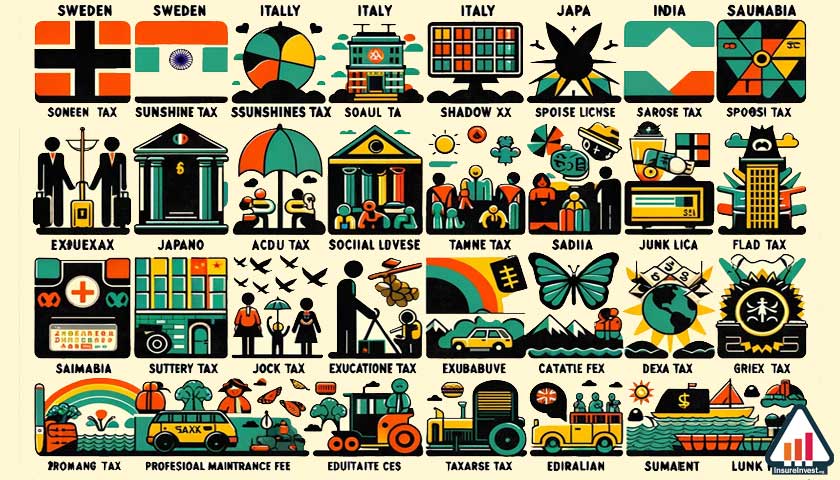Global Perspectives on Tax Evasion Methods and Regulatory Environments
Tax evasion, the illegal act of avoiding tax obligations through misrepresentation or concealment of income, is a global issue that governments strive to combat. While tax evasion is unethical and illegal, understanding the methods used and the regulatory environments of different countries provides insight into the complexities of global tax systems. This article explores common tax evasion methods employed worldwide, highlights countries with the strictest and most lenient tax enforcement, and discusses the global landscape of tax compliance.
Common Tax Evasion Methods Globally
Tax evasion takes various forms, often exploiting loopholes or leveraging jurisdictions with less stringent regulations. Below are some prevalent methods observed across the globe:
1. Offshore Accounts and Tax Havens
One of the most well-known methods involves hiding income or assets in offshore bank accounts or entities located in tax havens. These jurisdictions, such as the Cayman Islands, Bermuda, or Panama, offer low or zero tax rates, strict privacy laws, and minimal reporting requirements. Individuals and corporations transfer funds to these locations to conceal income from tax authorities.
2. Underreporting Income
Underreporting income is a widespread tactic, particularly among cash-based businesses or self-employed individuals. By failing to declare all earnings, such as tips, cash payments, or side income, taxpayers reduce their taxable income. This method is harder to detect in countries with limited digital transaction tracking.
3. Shell Companies and Complex Corporate Structures
Corporations often create shell companies—entities with no active business operations—in low-tax jurisdictions to shift profits. Through transfer pricing, companies manipulate the prices of goods or services traded between subsidiaries to allocate profits to low-tax regions, minimizing tax liabilities in higher-tax countries.
4. False Deductions and Inflated Expenses
Taxpayers may claim exaggerated deductions or inflate business expenses to reduce taxable income. This includes fabricating charitable donations, business travel expenses, or other deductible costs. In some cases, individuals or businesses maintain falsified records to support these claims.
5. Cryptocurrency and Digital Assets
The rise of cryptocurrencies has introduced new avenues for tax evasion. By conducting transactions through decentralized platforms, individuals can obscure income sources. Some fail to report crypto gains, exploiting the lack of centralized oversight in certain jurisdictions.
6. Cash Transactions and Informal Economies
In economies with significant informal sectors, cash transactions are common for evading taxes. Businesses or individuals may avoid issuing receipts or maintaining records, making it difficult for tax authorities to track income.
7. Misclassification of Income
Some taxpayers misclassify income to benefit from lower tax rates. For example, labeling income as capital gains rather than ordinary income can reduce tax liability in countries where capital gains are taxed at a lower rate.
8. Fake Invoices and Bogus Transactions
Creating fake invoices or engaging in sham transactions allows businesses to inflate costs or hide income. This method is common in industries with complex supply chains, where fraudulent documentation can be harder to trace.
Countries with the Strictest Tax Enforcement
Certain countries are renowned for their rigorous tax enforcement, employing advanced technology, international cooperation, and strict penalties to combat evasion. Below are some of the strictest jurisdictions:
1. United States
The U.S. Internal Revenue Service (IRS) is one of the most aggressive tax authorities globally. The IRS uses sophisticated data analytics, whistleblower programs, and international agreements like the Foreign Account Tax Compliance Act (FATCA) to track offshore accounts and unreported income. Penalties for evasion include hefty fines and imprisonment, with audits targeting high-income individuals and corporations.
2. Germany
Germany’s tax authority, the Bundeszentralamt für Steuern, maintains strict oversight, particularly on cross-border transactions. The country actively participates in global initiatives like the Common Reporting Standard (CRS) to exchange financial information. Tax evasion in Germany can result in severe penalties, including jail time for significant offenses.
3. United Kingdom
The UK’s HM Revenue and Customs (HMRC) employs advanced digital tools and collaborates internationally to detect evasion. The UK has cracked down on offshore tax havens and introduced measures like the Criminal Finances Act, which penalizes entities facilitating evasion. Taxpayers face audits, fines, and public naming for non-compliance.
4. Canada
The Canada Revenue Agency (CRA) is known for its thorough audits and use of data-sharing agreements to track offshore income. Canada’s Voluntary Disclosures Program encourages compliance but imposes strict penalties for deliberate evasion, including fines up to 200% of the evaded tax.
5. Australia
The Australian Taxation Office (ATO) leverages data-matching technology and international cooperation to combat tax evasion. Australia’s focus on multinational corporations and high-net-worth individuals has led to increased scrutiny of offshore structures and transfer pricing.
Countries with the Most Lenient Tax Enforcement
Some jurisdictions are perceived as more lenient due to low tax rates, minimal reporting requirements, or limited enforcement capacity. These countries often attract individuals and businesses seeking to minimize tax obligations.
1. Monaco
Monaco imposes no personal income tax, making it a haven for wealthy individuals. While this is not evasion per se, the lack of income tax and minimal financial reporting requirements attract those looking to shield income legally.
2. Bermuda
Bermuda has no income tax, corporate tax, or capital gains tax, and its regulatory environment is light. While it has adopted some international reporting standards, enforcement remains less stringent compared to high-tax jurisdictions.
3. Bahamas
The Bahamas offers a tax-friendly environment with no income or capital gains taxes. Its banking secrecy laws and limited cooperation with international tax authorities make it a popular destination for offshore accounts.
4. United Arab Emirates
The UAE has no personal income tax and minimal corporate taxes (except in specific sectors). Its tax enforcement is relatively relaxed, and the country is known for attracting businesses and individuals seeking low-tax environments.
5. Panama
Panama’s territorial tax system only taxes income earned within the country, and its historically strong banking secrecy laws have made it a hub for offshore financial activities. While recent reforms have increased transparency, enforcement remains less rigorous than in stricter jurisdictions.
Global Efforts to Combat Tax Evasion
International organizations like the OECD and G20 have spearheaded efforts to curb tax evasion. The Common Reporting Standard (CRS) facilitates the automatic exchange of financial information among over 100 countries, making it harder to hide assets offshore. Initiatives like the Base Erosion and Profit Shifting (BEPS) project target corporate tax avoidance by addressing loopholes in transfer pricing and profit shifting.
Technological advancements, such as blockchain analysis for cryptocurrency transactions and AI-driven audit systems, have enhanced tax authorities’ ability to detect evasion. However, challenges remain, particularly in jurisdictions with limited resources or political will to enforce tax laws.
Ethical and Legal Considerations
While some individuals and businesses exploit legal loopholes to minimize taxes (tax avoidance), tax evasion is illegal and carries significant risks. Beyond financial penalties and imprisonment, evaders face reputational damage and loss of trust. Governments worldwide are increasing transparency and cooperation, narrowing the opportunities for evasion.
Tax evasion methods, from offshore accounts to underreporting income, exploit gaps in global tax systems. Countries like the United States, Germany, and the United Kingdom maintain stringent enforcement, leveraging technology and international agreements to ensure compliance. Conversely, jurisdictions like Monaco, Bermuda, and the Bahamas offer lenient tax environments, attracting those seeking to minimize tax burdens. As global cooperation and technology advance, the window for tax evasion continues to shrink, emphasizing the importance of compliance in an increasingly transparent financial world.




